Smallholding - introduction

“The greatest fine art of the future will be the making of a comfortable living from a small piece of land.” – Abraham Lincoln
Contents
What is smallholding?
A smallholding is a residential site with more land than a garden, but less than a farm. The land is typically used for productive mixed crops including livestock raised on a non-commercial basis and woodland management for fuel. Often there will be growing both for the needs of the residents (subsistence farming) and for cash crops. The lines between garden, smallholding and farm are blurred but basically a smallholding is just a very small mixed farm – small being relative to the size of farms in that particular society. Crofts (Scotland) are smallholdings, although there is a legally-defined tenure for a croft, but not for a smallholding. Smallholdings can be comprised of families, individuals or communities, where people pool resources to hold land together.

Smallholding is still the most common livelihood in the world, even though there is a global flow from country to city (and in the West, a trickle has started in the opposite direction). The UK has larger farms than anywhere else in Europe, due to a history of deliberate policies intended to phase out smaller farms. The Enclosures were the most obvious example of this (and in Scotland, the Highland Clearances). Landowners and factory owners were often in conflict, but when it came to despatching poor farmers into cities to become factory fodder, they were in complete agreement. Also in the UK, primogeniture (passing land on to the eldest son) tended to monopolise land ownership. In France, this system was changed after the revolution, and helped to keep holdings smaller.

There have been some moves that have encouraged smallholding, however. Copyhold tenure came out of the feudal system (after the labour shortages caused by the Black Death), setting out the duties of peasant farmers to the lord of the manor. By the 19th century these had turned into ordinary freeholds or leaseholds. There was a smallholding revival in the early 20th century. The Liberal Party won the 1906 election on a land reform ticket, and brought in the Allotments and Smallholdings Act of 1908 that initiated county smallholdings – county councils were able to buy land and rent to smallholders. Land taxes were introduced after World War 1, and about a quarter of all English land changed hands. Many large estates were sold off for housing, land resettlement and farms. The land resettlement scheme was designed for returning soldiers, and then when the depression kicked in, for unemployed rural workers.
The land resettlement scheme was finally killed off by Mrs Thatcher, and then John Major advised county councils to sell off county smallholdings. Now the situation is becoming more polarised. As farms go bust, some parts are sold to already large farmers, and some parts get sold to a variety of individual buyers, including horsey folk, leisure parks and smallholders.
What are the benefits of smallholding?
Productivity
Smallholdings can be more productive per acre than larger farms because they often have many uses for the same patch of land e.g. a fruit orchard containing sheep, chickens and bees. Crop output can benefit from the inter-relationships between species when grown together i.e. polyculture versus monoculture (and, just maybe, when there is more love applied per acre by smallholders living on and from their land than large farms with huge subsidies and absentee landlords).
Small is bountiful: smallholdings produce more food per acre than large farms; Scientific American agrees, as does the UN; and here’s GRAIN’s report. For those who think industrial agriculture is more ‘efficient’, they can surely only mean in the very short term, as industrial agriculture destroys soil, which is catastrophic for farming in the long term.

Environmental
Smallholders on their own land are often inventive with their methods and harvests, as their rewards are not purely financial. Many experiment with low-impact practices and technologies such as tree-planting, wind turbines, reed beds, rainwater harvesting, charcoal burning etc. As smallholders can provide more of life’s necessities for themselves and their local communities there are reduced transport needs and associated fossil fuel usage. The varied activities on a mixed smallholding allow and encourage more biodiversity and of course, environmental benefits are far greater if the smallholding doesn’t use toxic pesticides and builds soil with compost and manure rather than applying synthetic chemicals.

Social
Smallholdings employ more people per hectare than larger farms, and so provide benefits to rural economies in terms of employment and locally-produced goods for sale. Buying from smallholdings (see below) rather than supermarkets helps keep money local, which is important because stronger rural communities and economies can retain more services such as buses and post offices, and can support traditional skills such as blacksmithing and hedgelaying.
Personal
It’s not easy to make a living from a smallholding, but no more difficult than from a larger farm. Smallholdings offer activities that are varied, physically and mentally demanding, healthy, creative, outdoors and close to nature. It’s less of a job and more of a way of life – in fact another word for smallholding is lifestyle farming. The rewards are social, environmental and we might even say spiritual, with greater independence from commercial pressures.
What can I do?
It’s important that you get some experience, find out what works well and what doesn’t, and see if the lifestyle is for you. Many people use WWOOFing as an opportunity to talk to smallholders and farmers, or an apprenticeship to pick up skills.
Next work out what you want to do – market gardening, animals, or a combination of the two; or maybe something more specialised – veg box scheme, bees, mushrooms, flowers, wood fuel, polytunnels or point-of-lay hens. Of course you need to know how to do those things, so you need some training, some targeted WWOOFing, or a job at a specialist farm for a while.

You’ll need some money. If you don’t have a house to sell it’s increasingly common to get together with other people, buy the land together and divide it up accordingly. There will be benefits in having a cluster of smallholdings – shared vehicles and equipment, marketing, childcare, labour, and being able to get away for the occasional holiday.
Then find some land. Word of mouth is good, and about 5-10% of estate agents specialise in land. More than half of land sales are via auctions – run by estate agents. If the land has a house already on it, it’s less likely to be sold at auction. Woodland tends to be less expensive than agricultural land, but it’s catching up. Also, an online search will help you find sites with listings of land suitable for smallholdings for sale – like this one for example.

Your workload will depend on the activities you choose. On 50 acres it might be possible to run beef cattle on a very part-time basis, but a smaller more intensively-run mixed holding with vegetables could involve a lot more work. If you’re going to run a successful smallholding, you’re going to need outlets for your produce. To avoid the exploitation of corporate supermarkets, there are various, local, direct options, such as:
- Community supported agriculture
- Veg box schemes & home deliveries
- Farmers’ markets and direct farm sales
The Ecological Land Co-op provides land with planning permission to build a home for new entrants into smallholding.
How can I get started if I can’t afford a holding with residential permission?
This is a question asked by lots of people because, unless you have a house to sell, getting a smallholding with a house on is usually prohibitively expensive. But buying land and attempting to get permission to live on it is not a decision to take lightly either. To live on your smallholding – you have to prove to the planners:
- that your enterprise is viable and can maintain a livelihood
- that you have a need to be there for the purposes of the enterprise
You can apply to your local planning authority to build a house, but the process could take a long time, is often unsuccessful and many people give up. Things are easier if you live in Wales, due to the One Planet Development policy.

One option is to build your house and apply for permission retrospectively. This not an offence, but can also take a long time. Permission is more likely for an enterprise that is demonstrably competent and financially viable. If it’s neither of those things, then you probably won’t succeed. You have to put in copious management plans with your application. Write down what you’re going to do, all the costs, and targeted profits over 3 years. If you build a single dwelling house on your smallholding and live in it continuously for 4 years and can prove it, then you will be immune from planning enforcement (which is the equivalent of having planning permission).
Being allowed to live on your smallholding can be very complicated however, and we suggest you do your homework first. See here for more information on obtaining planning permission generally, and here for advice on obtaining planning permission in the countryside from someone who did it. Read Chapter 7’s website and Rural Planning Handbook, and/or attend a smallholding or a planning course. Also be aware of the Ecological Land Coop, who are successfully buying plots of land and gaining permission for committed growers to live there legally.
Specialist(s)
Thanks to Simon Fairlie of the Land for information.
The specialist(s) below will respond to queries on this topic. Please comment in the box at the bottom of the page.

Chris Smaje co-runs Vallis Veg, an 18-acre farm in Somerset – woodland, grassland, orchard and cropland for vegetables sold locally. There are also educational events, camping and livestock raised on a semi-commercial basis. His blog looks at the political (mostly) but also practical case for small-scale agriculture; he helped his holding become a thriving enterprise with permanent planning permission for an agricultural dwelling.

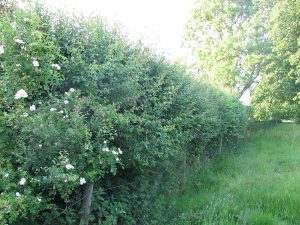

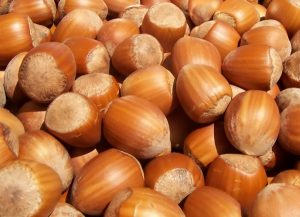

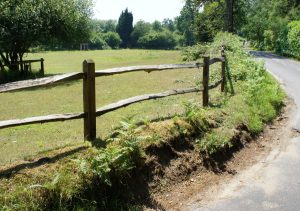

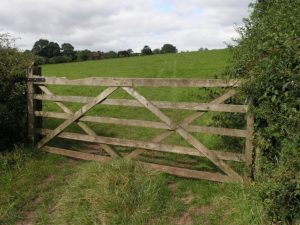

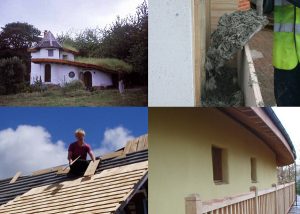
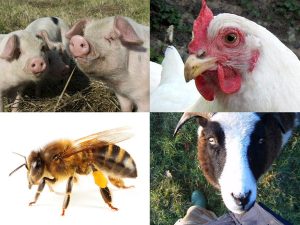
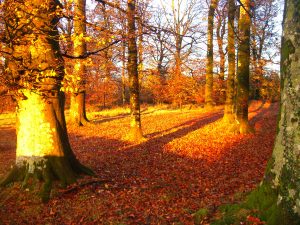
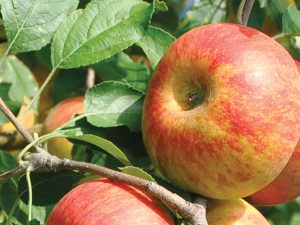
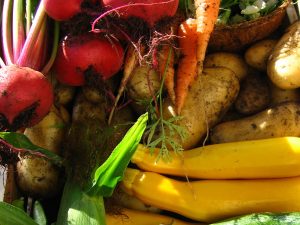

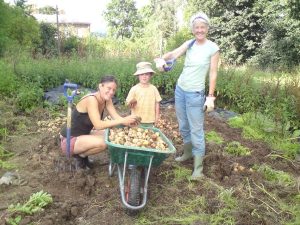


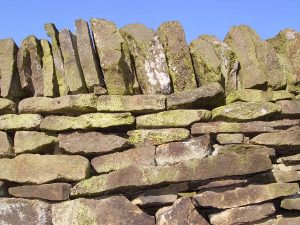
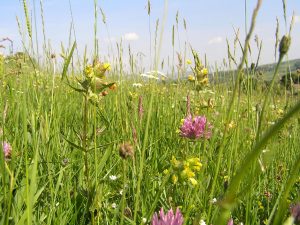

26 Comments
Very interesting and funny
https://m.facebook.com/story.php?story_fbid=1786223838282549&substory_index=0&id=1786096494961950
I have some land in France, small plot and fallen down building. There are some fruit and nut trees. I am unable to live there at the moment but would really like that this land could be lived on and appreciated now. Trying to think of a way forward, looking for 1 or 2 people who might like to be guardians for this space for a few years in a quiet and environmentally friendly manner so tentatively putting out feelers. Any ideas?
Hello Denise. Whereabouts in France is your land?
Hi Theresa
Region Centre, about 40 mins drive north west of Tours.
Hi! I’m just wondering if you can help point me in the right direction. I’m looking to start a small holding for urban farming but have no start up capital. Do you know of any resources, investors or funding available for business start ups. There’s is very little information freely available. Thanks for any help you can give me. I’m Midlands based at the moment and there isn’t any Urban farming projects close to where I live otherwise I’d visit and ask how they got started. I have no savings and own no property so it seems it may be a struggle to buy land and get started.
Hi Rhiannon, My name is Emlyn and I am one of the founders of https://savetheearth.coop/ a members owned and run cooperative, you can reach out to me at emlyn(AT-)savetheearth(DOT)coop or find me at our facebook group and send me a PM https://www.facebook.com/groups/Savetheearthnow/ . We are looking for motivated people like your good self to become members of our cooperative and who have to passion and drive to set up a working group in your community to set up ventures like an urban farm like you mentioned above.. we help our members find grants, loans, investments and set up crowdfunding to start projects.. If your interested in finding out more, let’s have a chat and see if our opportunity is a good fit for your plans and let’s see if we can work together and get your urban farm idea off the ground.
Hi…I also live in the Midlands and have been trying to start my own smallholding..one that can involve the community as much as possible e.g. volunteer, education, hampers for those who need/ want it. Did you get any other feedback or advice?
Hi Denise, did you get any further forward with your proposal on the land ?
Hi, I have 5.9 acres of land (2.5 of which is a walled garden) and a derelict listed building. It is Listed and has planning permission to extend to a circa 1900ft2 house. It is 5 miles north of Dumfries, Scotland. I am considering selling this. If anyone interested please give me a call on 07466 910020.
Can I convert a woodlands (in Scotland) to a smallholding and thereby gain permission to live there as long as I am running a viable, sustainable, environmentally kind business for which I need to be present year round?
Maranu
I give advice on this sort of thing in England but I am not familiar with the policies applicable in Scotland which might also vary in wording and application in different regions. You would have to speak to the planners iand/or a planning consultant familiar with the area in which you are interested
LOOKING FOR HELP ON MY SMALLHOLDING. I could do with help with all the usual kind of things fencing, gates, animals, veg. caravan and an outside kitchen for your use. there is also the possibility of paid work in the area if you are ‘handy’ . the smallholding is in southern portugal.
Gailhart , are you still looking for help? I have over twenty years experience in the building trade . I have worked on natural building projects in California , Ghana , Nigeria and also the UK. My trade is stone masonry but my skills go far beyond that . I help set up a community agriculture project in Exeter Devon and also in P.A USA . I do have a large family 6kids but they are all hard workers and quick learners and my wife grew up on farms in the UK . Jason
Hi
Can anyone tell me if the One Planet scheme in wales can help find suitable land? We live down in Cornwall and can’t find anything at all. There’s too many restrictions on land and it’s far too expensive to purchase.
Hi Ian. The One Planet Development is a national policy (Wales) open to anyone. As a policy it doesn’t provide any service e.g. helping find land. However there is a very active group — the One Planet Council http://www.oneplanetcouncil.org.uk — that promotes the OPD. The Facebook page often has questions, queries and discussion about available land! Worth a look. Best of luck with your journey. phil
Hi, How much land do I need to list myself as a smallholding and can I do it just by growing veg etc.
Hi we have a smallholding with pole barn and static caravan which we use for day use only. We had equine stock but now we want to do goats, chickens and geese. We have been given permission to live there temporary due to coronavirus as stock are inside buildings. Could we now do a business plan that would be considered bt south kesteven council to change to get planning permission for living keeping use of agrculture/equine. What are my chances
Hi Ken & Tracey
Regarding Ken’s question, as far as I’m aware there isn’t such a thing formally as listing yourself as a smallholding. If you want to keep farm livestock you’ll need to register your holding by getting a County Parish Holding (CPH) number – see https://www.gov.uk/guidance/register-land-you-use-to-keep-livestock. You’ll then need to take further registration steps to become a livestock keeper. Even if you don’t plan to keep livestock but are planning commercial activity on your holding, there’s a case for getting a CPH number since this keys you in to various official and commercial bodies with which you might deal as a smallholder.
Regarding Tracey’s question, yes you can apply for planning permission (usually to the district council) for an agricultural dwelling that enables you to live on the holding. Usually, the council will only grant temporary permission for 3 years in the first instance in a temporary dwelling – so if you already have a static on site that’s ideal. After that you can apply for permanent permission. The main criteria usually are whether your business stacks up as a profitable concern, whether it employs somebody full time, and whether you need to be on site in order to conduct the business. Have a look at your council’s local plan, which should have a policy on agricultural dwellings. Another good source is Simon Fairlie’s ‘Rural Planning Handbook’. It’s hard to say what your chances are – so much depends on the specifics of your situation and the council’s response. Some people get into gruelling, long-term planning battles and you have to expect to be turned down and to go to appeal. But a lot of people do get permission in the end. Bear in mind that the council will probably place an agricultural condition on the dwelling, meaning that at least one of the people living there must be employed full time in agriculture, and that this will affect the market value of the dwelling.
I hope that’s helpful,
Chris
I currently have 23 acres and it is labelled as a farm, there is a house on the property and some barns which now have commercial permission for our other business as it was proved before we bought the property it was not sufficient to earn a living from farming and the agricultural tie lifted. Whenever we try to put in permission for a building under the 28 day Agricultural permitted development we are tld there is no evidence of there being farming on the land, which there hasn’t been for many years but we would like to start keeping animals and growing veg etc. When we apply for a building such as a summer house around our lake we are told it is an agricultural area and it’s not permitted as it is considered trying to domesticate the land!. Is it better, or even possible, to get the land considered a smallholding rather than a farm? If so, how would you go about this? At the moment we appear to fall in to a great big gap
Hi, looking for a consultant to help with the process of finding land…? If such a person exists. I’m aware, particularly at the moment, that smallholdings, barns, land with PP etc advertised online and through very accesssible platforms like rightmove etc, are at a really high premium, marketed to wealthy bods looking to plant a satellite home in the countryside, the covid exodus.
I cant shake this feeling that there is a more hidden market? perhaps on a more local level, plots for less grandiose plans. Or ones that simply dont make it as far as Rightmove before being sold. But I dont know how to get my foot in that door.
Also, advice, once that plot is found, on the best way of having it surveyed etc. Is there someone independent out there that can assist?
I’m very serious, on a timescale, have capital (to a certain extent) but am aware of my limitations.
Thanks!
Paul
Hi, in response to Janet’s query, I’m not a planning professional and it sounds like you might need to get some professional advice, but the messages you’re getting from your local planning authority sound odd to me. In my experience, planning officers will often tell you things that aren’t actually true and aren’t grounded in planning law or policy – and it’s all got even more confused since the introduction of the new national planning policy framework. The first question is whether you have an agricultural holding number – you’ll need this if you want to keep livestock. Once you have a holding number, it gives you some kind of agricultural recognition. You should be able to get planning permission under permitted development rights for appropriately-sized non-residential agricultural buildings. Whether the land has been farmed or not recently shouldn’t be relevant. If the buildings you’re planning aren’t too large or costly, the other option is to just build them and then apply for retrospective planning permission if necessary.
In response to Paul’s query, again I’m no professional but yes rural land is much sought after and when it does change hands it’s often through hidden local routes. Bare agricultural land without buildings is much cheaper, but then if you do want to build on it you have to go through the rigours of the planning process. Agricultural estate agents (such as Cooper and Tanner in the area of Somerset where I live) sell various different kinds of rural land with or without buildings or planning consent, and usually hold regular auctions for selling land. So if you identify areas where you’d like to buy land, find the local agricultural estate agents and get on their mailing list that should help you get a sense of things. If you have a chat with one of their agents they may be able to put you in touch with landowners interesting in selling, but then you start getting into the more informal networking kind of stuff which sometimes bears fruit but isn’t always easy if you’re an outsider. Another possibility, depending on what you want to do, is to connect with the Ecological Land Co-op as a potential steward and find a holding that way (disclosure: I’m one of its directors).
Best wishes, Chris Smaje
anyone know how to cope with never being able to afford land and being stuck in a crappy flat for rent for ever?
Get more money. If not try and check out urban growing. Get chickens (if you can) or quail which do better in urban areas. grow expensive foods like herbs and salads. Try and get an allotment and start a market garden scheme (give me advice if you succeed). Invest in a portfolio of community energy schemes or make small scale/small interest loans to neighbors. Build community. In a (intensified) mutual credit world you can’t get “rich” but with mutualism you can grow your wealth and than reinvest in yourself/your community. If you start a smallholding with money “reaped” from your community you can give back by holding public events, providing quality food, healthy meat and education opportunities. Unlike capitalism which demands large-scale GDP growth, mutualism can promote community growth which is assets that benefit all and enrichen you. Solar panels providing cheap energy require a long term investment but can provide more money for you and free up money for your community (but mainly you) and it keeps money in the community as long as you buy local. I live in a urban area but manage a very productive allotment that produces 40% of my family’s produce for 6 hours max a week. If there is a community garden you can set up a deal. I get salad leaves (mainly miners lettuce) and cut flowers from the community garden in return for 2 and a half hours of work a week. If you are getting by on the penny build your community bond and then (even though it may hurt your pride)…ask for help. You can also look at parks, unused gardens, canals and rooftops as opportunities to set up a deal. I’m going to try to set up a veg box scheme as a second income source. Bees are by far the most profitable livestock you can keep, they give SO much honey. Just plant herbs, clovers, berries, fruit trees and wildflowers all around the city and you’ll be raking it in while beatifying your city. hope this helps you love the one your with so to speak.
I don’t know if anyone will find this comment.
I’m in Washington state and I found this site while looking up the word Croft.
I’m looking to buy land and I wanted to figure out how to share it. Is anyone interested in being a part of a large parcel, perhaps in Okanogan county? I have many contacts for livestock and markets and hunting and gold panning . There are lots of national and state forests, rivers and lakes.
If we each had at least five acres and shared a well, solar power, etc, I think we could create something wonderful. We could also have the use of a city property near Seattle for when we need that. ( markets, education, medical , etc).
Please check my YouTube channel under the name Lily Gazou.
If none of this works out, perhaps I could help others in Scotland or Ireland to have a Croft there. Just let me visit someday.
Best wishes to all.
Hi I’m not sure if I’m in the right place but have been really struggling to find my answers. So if anyone here could help I would be very grateful
Me and my partner are really looking into getting an RV to live in and are struggling to find places to park up on a 12 month basis etc. We plan to travel on weekends and continue to work for a while. We’re in the uk and now thinking of buying land and parking up there. Ideally for the time being I wasn’t to grow my own fresh veg and herbs etc. But we plan on moving to Wales sometime in the next few years and do the same, but make it into a small holding full time. Does anyone know if buying land and living in a Mobile home is possible and what it would entail with regards declaring to local authorities?
Many thanks in advance
Kim
Most of what Chris says is sound including the uncertainty built into a system run by individuals at local level (officers and councillors) and at appeals (inspectors) who have varied amounts of knowledge, competence and prejudices. I would add a word of caution about the 4 year rule that provides immunity from enforcement against buildings, as there is sometimes an issue of an associated change of use of land for which the immunity period is ten years. And deliberately concealing the breach of planning (eg lying to an enforcement officer) allows the planning authority the challenge the immunity.